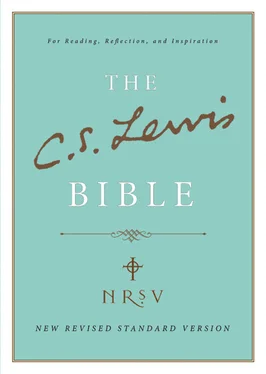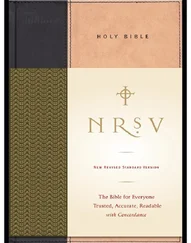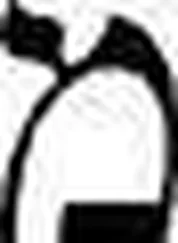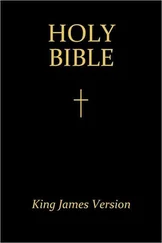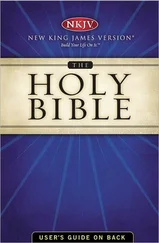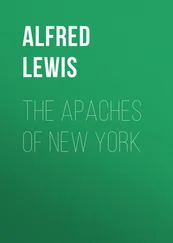It will be seen that in the Psalms and in other prayers addressed to God, the archaic second person singular pronouns (thee, thou, thine) and verb forms (art, hast, hadst) are no longer used. Although some readers may regret this change, it should be pointed out that in the original languages neither the Old Testament nor the New makes any linguistic distinction between addressing a human being and addressing the Deity. Furthermore, in the tradition of the King James Version one will not expect to find the use of capital letters for pronouns that refer to the Deity—such capitalization is an unnecessary innovation that has only recently been introduced into a few English translations of the Bible. Finally, we have left to the discretion of the licensed publishers such matters as section headings, cross-references, and clues to the pronunciation of proper names.
This new version seeks to preserve all that is best in the English Bible as it has been known and used through the years. It is intended for use in public reading and congregational worship, as well as in private study, instruction, and meditation. We have resisted the temptation to introduce terms and phrases that merely reflect current moods, and have tried to put the message of the Scriptures in simple, enduring words and expressions that are worthy to stand in the great tradition of the King James Bible and its predecessors.
In traditional Judaism and Christianity, the Bible has been more than a historical document to be preserved or a classic of literature to be cherished and admired; it is recognized as the unique record of God’s dealings with people over the ages. The Old Testament sets forth the call of a special people to enter into covenant relation with the God of justice and steadfast love and to bring God’s law to the nations. The New Testament records the life and work of Jesus Christ, the one in whom “the Word became flesh,” as well as describes the rise and spread of the early Christian Church. The Bible carries its full message, not to those who regard it simply as a noble literary heritage of the past or who wish to use it to enhance political purposes and advance otherwise desirable goals, but to all persons and communities who read it so that they may discern and understand what God is saying to them. That message must not be disguised in phrases that are no longer clear, or hidden under words that have changed or lost their meaning; it must be presented in language that is direct and plain and meaningful to people today. It is the hope and prayer of the translators that this version of the Bible may continue to hold a large place in congregational life and to speak to all readers, young and old alike, helping them to understand and believe and respond to its message.
For the Committee,
BRUCE M. METZGER
OLD
TESTAMENT
Chapter 1
Chapter 2
Chapter 3
Chapter 4
Chapter 5
Chapter 6
Chapter 7
Chapter 8
Chapter 9
Chapter 10
Chapter 11
Chapter 12
Chapter 13
Chapter 14
Chapter 15
Chapter 16
Chapter 17
Chapter 18
Chapter 19
Chapter 20
Chapter 21
Chapter 22
Chapter 23
Chapter 24
Chapter 25
Chapter 26
Chapter 27
Chapter 28
Chapter 29
Chapter 30
Chapter 31
Chapter 32
Chapter 33
Chapter 34
Chapter 35
Chapter 36
Chapter 37
Chapter 38
Chapter 39
Chapter 40
Chapter 41
Chapter 42
Chapter 43
Chapter 44
Chapter 45
Chapter 46
Chapter 47
Chapter 48
Chapter 49
Chapter 50
1 In the beginning when God created[ 1] the heavens and the earth, 2the earth was a formless void and darkness covered the face of the deep, while a wind from God[ 2] swept over the face of the waters. 3Then God said, “Let there be light”; and there was light. 4And God saw that the light was good; and God separated the light from the darkness. 5God called the light Day, and the darkness he called Night. And there was evening and there was morning, the first day.
6 And God said, “Let there be a dome in the midst of the waters, and let it separate the waters from the waters.” 7So God made the dome and separated the waters that were under the dome from the waters that were above the dome. And it was so. 8God called the dome Sky. And there was evening and there was morning, the second day.
9 And God said, “Let the waters under the sky be gathered together into one place, and let the dry land appear.” And it was so. 10God called the dry land Earth, and the waters that were gathered together he called Seas. And God saw that it was good. 11Then God said, “Let the earth put forth vegetation: plants yielding seed, and fruit trees of every kind on earth that bear fruit with the seed in it.” And it was so. 12The earth brought forth vegetation: plants yielding seed of every kind, and trees of every kind bearing fruit with the seed in it. And God saw that it was good. 13And there was evening and there was morning, the third day.
For reflection: Genesis 1:1
No philosophical theory which I have yet come across is a radical improvement on the words of Genesis, that “In the beginning God made Heaven and Earth.”
—from Miracles
14 And God said, “Let there be lights in the dome of the sky to separate the day from the night; and let them be for signs and for seasons and for days and years, 15and let them be lights in the dome of the sky to give light upon the earth.” And it was so. 16God made the two great lights—the greater light to rule the day and the lesser light to rule the night—and the stars. 17God set them in the dome of the sky to give light upon the earth, 18to rule over the day and over the night, and to separate the light from the darkness. And God saw that it was good. 19And there was evening and there was morning, the fourth day.
20 And God said, “Let the waters bring forth swarms of living creatures, and let birds fly above the earth across the dome of the sky.” 21So God created the great sea monsters and every living creature that moves, of every kind, with which the waters swarm, and every winged bird of every kind. And God saw that it was good. 22God blessed them, saying, “Be fruitful and multiply and fill the waters in the seas, and let birds multiply on the earth.” 23And there was evening and there was morning, the fifth day.
24 And God said, “Let the earth bring forth living creatures of every kind: cattle and creeping things and wild animals of the earth of every kind.” And it was so. 25God made the wild animals of the earth of every kind, and the cattle of every kind, and everything that creeps upon the ground of every kind. And God saw that it was good.
In the darkness something was happening at last. A voice had begun to sing. It was very far away and Digory found it very hard to decide from what direction it was coming. Sometimes it seemed to come from all directions at once. Sometimes he almost thought it was coming out of the earth beneath them. Its lower notes were deep enough to be the voice of the earth herself. There were no words. There was hardly even a tune. But it was, beyond comparison, the most beautiful noise he had ever heard. It was so beautiful he could hardly bear it. . . .
Then two wonders happened at the same moment. One was that the voice was suddenly joined by other voices; more voices than you could possibly count. They were in harmony with it, but far higher up the scale: cold, tingling, silvery voices. The second wonder was that the blackness overhead, all at once, was blazing with stars. They didn’t come out gently one by one, as they do on a summer evening. One moment there had been nothing but darkness; next moment a thousand, thousand points of light leaped out—single stars, constellations, and planets, brighter and bigger than any in our world. There were no clouds. The new stars and the new voices began at exactly the same time. If you had seen and heard it . . . you would have felt quite certain that it was the stars themselves who were singing, and that it was the First Voice, the deep one, which had made them appear and made them sing. . . .
Читать дальше
